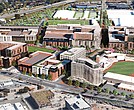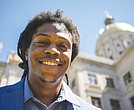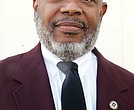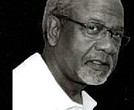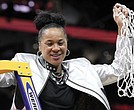Families decry ‘two systems of justice’ at D.C. march
Free Press wire reports | 9/3/2020, 6 p.m.
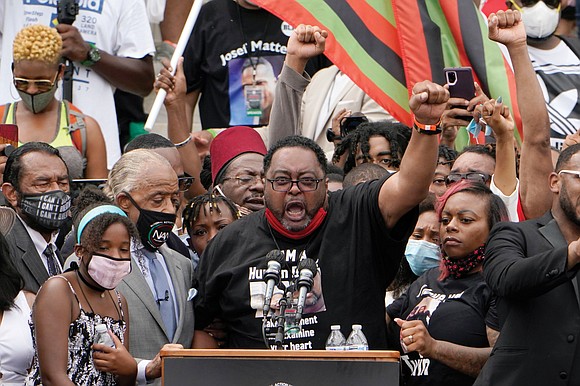
WASHINGTON - Standing on the steps of the Lincoln Memorial, where Dr. Martin Luther King Jr. famously laid out a vision for harmony between white and Black people 57 years ago, his son issued a sobering reminder about the persistence of police brutality and racist violence targeting Black Americans.
“We must never forget the American nightmare of racist violence exemplified when Emmett Till was murdered on this day in 1955, and the criminal justice system failed to convict his killers,” said Martin Luther King III, speaking to thousands who gathered Aug. 28 to commemorate the 1963 March on Washington for Jobs and Freedom.
“Sixty-five years later (after Emmett Till’s murder), we still struggle for justice — demilitarizing the police, dismantling mass incarceration, and declaring as determinately as we can that Black lives matter,” Mr. King said.
Even in the midst of the coronavirus pandemic, many felt compelled to join civil rights advocates in Washington to highlight a scourge of police and vigilante violence that gave way to what many feel is an overdue reckoning on racial injustice. Some stood in sweltering temperatures in lines that stretched for several blocks, as organizers took temperatures as part of coronavirus protocols. Organizers reminded attendees to practice social distancing and wear masks throughout the program, although distancing was hardly maintained as the gathering grew in size.
They gathered following another shooting by a white police officer of a Black man — this time, 29-year-old Jacob Blake in Kenosha, Wis., on Aug. 23 — sparking demonstrations and violence, including by a 17-year-old member of a white militia group who shot and killed two protesters and wounded a third. As peaceful protests turned to arson and theft, naysayers of the Black Lives Matter movement issued calls for “law and order.”
The Rev. Al Sharpton, whose civil rights organization, the National Action Network, planned last week’s 57th commemoration of the historic march, had a message for naysayers.
“Some say to me, ‘Rev. Al, y’all ought to denounce those that get violent, those that are looting,’” Rev. Sharpton said. “All of the families (of victims of police and vigilante violence) have denounced looting. What we haven’t heard is you denounce shooting.”
Rev. Sharpton asked, “We will speak against the looting, but when will you speak against wrong police shooting?”
Rev. Sharpton and Mr. King stood with relatives of an ever-expanding roll call of victims — Mr. Blake, George Floyd, Breonna Taylor, Rayshard Brooks, Ahmaud Arbery, Trayvon Martin and Eric Garner, among others.
Mr. Arbery and Mr. Martin both were killed by men who pursued them with guns and whose arrests were delayed until residents protested.
“There are two systems of justice in the United States,” said Jacob Blake Sr., the father of the man whose shooting by police in Kenosha left him paralyzed from the waist down. “There’s a white system and a black system. The black system ain’t doing so well.
“No justice, no peace!” he proclaimed.
Philonise Floyd, brother of the late Mr. Floyd who was killed by a police officer on May 25 in Minneapolis, stared out at the massive march audience and said he wished his brother was there to see it.
Last Friday’s march shaped up to be the largest political gathering in Washington since the pandemic began. Many attendees wore T-shirts of the late U.S. Rep. John Lewis of Georgia who, until his death on July 17, was the last living speaker at the original March on Washington for Jobs and Freedom. That march went on to become one of the most famous political rallies in U.S. history, and one of the largest gatherings with more than 200,000 people in attendance.
Organizers said they intended to show the urgency for federal policing reforms, to decry racial violence and to demand voting rights protections ahead of the November general election. A handful of satellite marches were held in other states.
Democratic vice presidential nominee Kamala Harris, in a video, said the original conveners would be disappointed that Black Americans are still marching for justice and equality under the law.
“I have to believe that if they were with us today, they would share in our anger and frustration as we continue to see Black men and women slain
in our streets, and left behind in our economy and justice system that has too often denied Black folks our dignity and rights,” she said.
Former Vice President Joe Biden tweeted his support for the march.
Although President Trump did not comment on the march, the Republican National Committee marked the event’s anniversary by highlighting the president’s record as a “champion for the Black community.”
“While there is more work to be done, Donald Trump is the leader to make it happen,” Paris Dennard, an RNC senior communications adviser, said in a statement.
Activist Frank Nitty, who said he walked 750 miles for 24 days from Milwaukee, Wis., to Washington for the march, spoke to the audience about persistence in the fight for justice.
“Are y’all tired? Because I’m tired,” Mr. Nitty said. “They think this is a negotiation, but I came here to demand change. My grandson ain’t gonna march for the same things that my granddaddy marched for.”
Navy veteran Alonzo Jones-Goss, 28, who traveled from Boston to participate in the march, said the nation has seen far too many tragic events that claimed the lives of Black Americans and other people of color, and “that needs to come to an end.”
Following the rally, participants marched to the King Memorial in West Potomac Park, next to the National Mall, and then dispersed. Some participants headed toward Black Lives Matter Plaza, which was renamed from Pennsylvania Avenue during protests in June.
Rev. Sharpton instructed those in other states to march on their U.S. senators’ offices in Rep. Lewis’ memory.
In June, the Democratic-controlled House of Representatives passed the George Floyd Justice In Policing Act, which would ban police use of stranglehold maneuvers and end qualified immunity for officers, among other reforms. A Republican-authored police reform bill, introduced in June by U.S. Sen. Tim Scott of South Carolina, who is Black, failed a procedural vote in the Senate because Democrats felt the measure didn’t go far enough to address officer accountability.
In July, following Rep. Lewis’ death, Democratic senators reintroduced legislation that would restore a provision of the historic federal Voting Rights Act of 1965 gutted by the U.S. Supreme Court in 2013. The law previously required states with a history of voter suppression to seek federal clearance before changing voting regulations.
Both measures are awaiting action in the Republican-controlled U.S. Senate.


